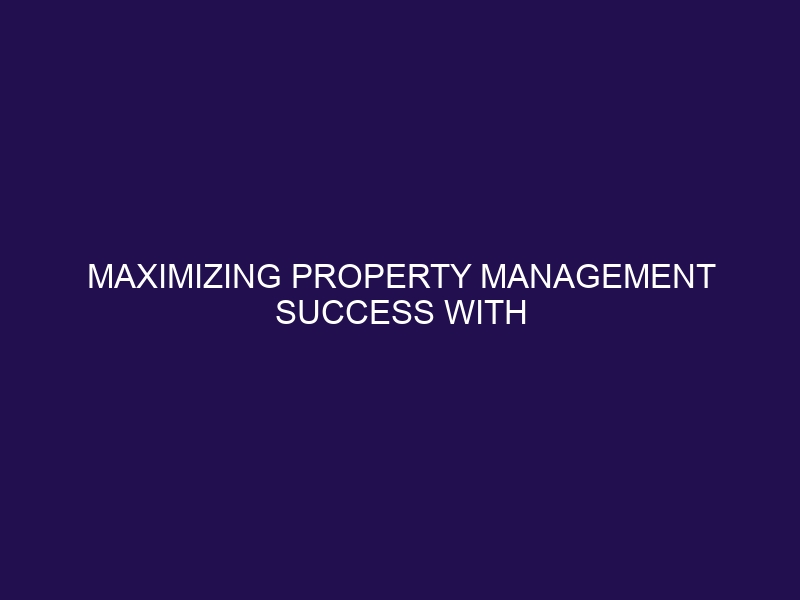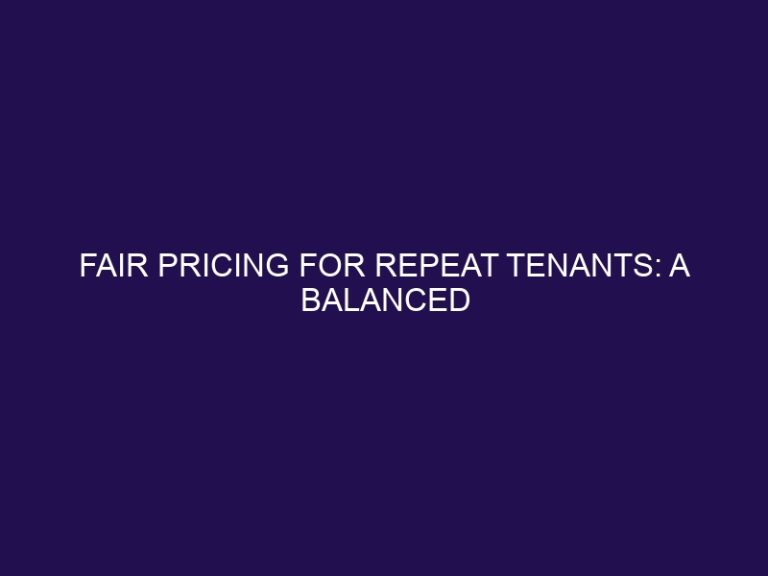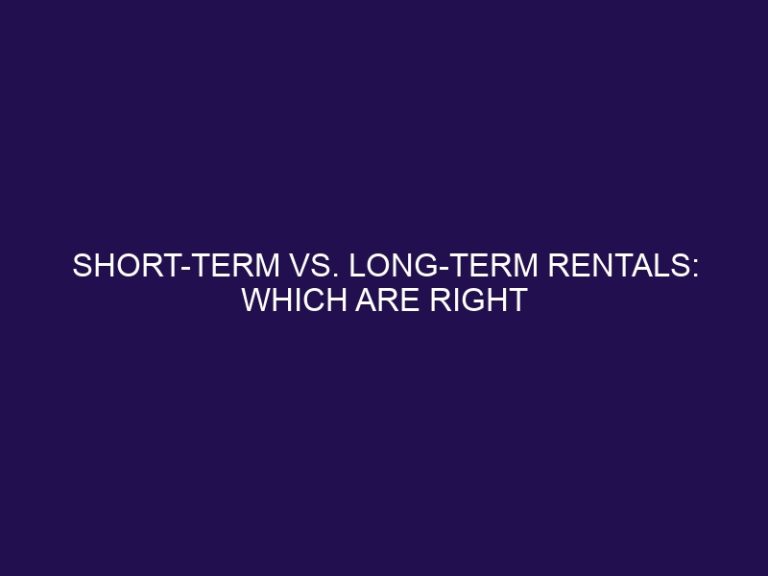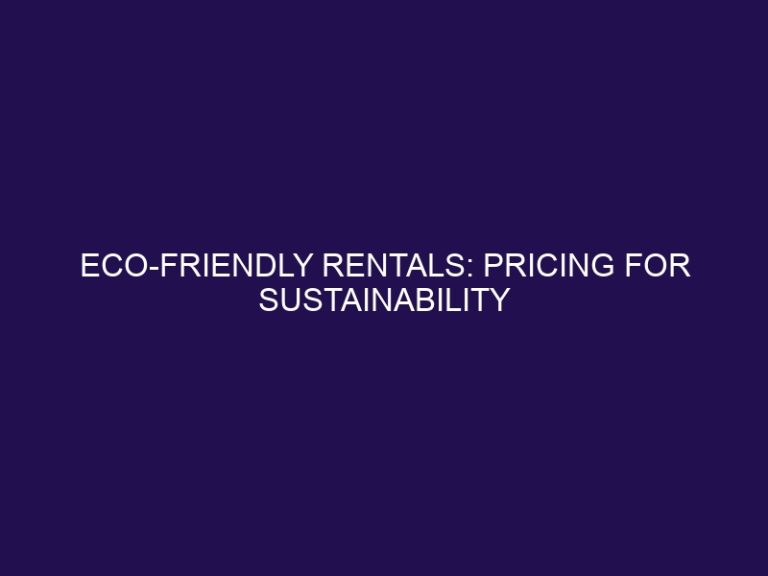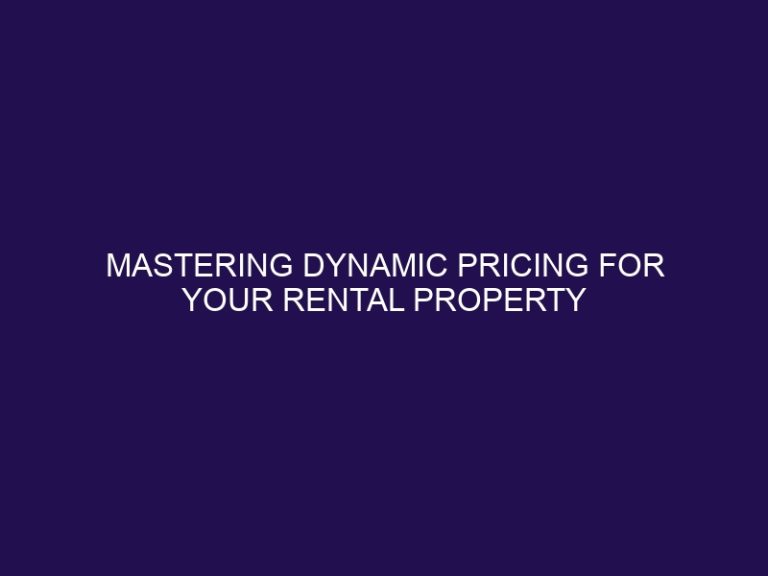Maximizing Property Management Success with Social Media Strategies
In today’s digital age, social media has become an essential tool for businesses to connect with their target audience and build a strong online presence. When it comes to property management, leveraging social media can be a game-changer, offering unique opportunities to engage with tenants, showcase properties, and enhance brand visibility.
In this article, we will delve into the dynamics of leveraging social media for property management success, exploring the strategies and best practices that can help property managers effectively utilize platforms like Facebook, Instagram, and LinkedIn to drive tenant retention, attract new renters, and ultimately elevate the overall success of their property management business.
Whether you’re a seasoned property manager or just starting out in the industry, understanding the power of social media in property management is crucial for staying competitive and achieving long-term success. Join us as we uncover the invaluable insights and actionable tips for harnessing the potential of social media to elevate your property management endeavors.
Key Takeaways:
The Dynamics of Onsite Property Management
The dynamics of onsite property management encompass a hands-on approach to overseeing rental properties, involving a wide array of day-to-day tasks such as tenant relations, maintenance, repairs, and the responsible collection of rent.
Leveraging Social Media for Property Management Success
Leveraging social media for property management success involves strategically utilizing online platforms to enhance the visibility and engagement of rental properties, fostering community connections, and implementing targeted marketing strategies.
Effective social media strategies can include creating high-quality visual content showcasing properties, engaging with potential tenants through interactive posts, and utilizing advertising features to reach a broader audience.
Community engagement tactics encompass fostering a sense of belonging and providing valuable information about local events, amenities, and lifestyle to attract and retain residents.
Maintaining a strong online presence allows property managers to communicate efficiently and promptly with tenants, address concerns, and showcase the unique features of each property, ultimately fostering trust and credibility within the community.
Building a Strong Brand in Property Management
Building a strong brand in property management revolves around establishing a reputable identity, delivering exceptional customer experiences, and strategically positioning rental properties within the market to drive differentiation and recognition.
Branding strategies entail creating a distinct visual identity, including logo design, color schemes, and brand messaging that resonates with the target audience. Maintaining a consistent brand image across all touchpoints, from property signage to online platforms, is crucial.
Customer experience management plays a pivotal role in brand building, as it involves understanding tenants’ needs and preferences, providing efficient property maintenance, and offering responsive communication. Market positioning involves analyzing the competitive landscape, identifying unique selling propositions, and crafting compelling marketing strategies to attract prospective tenants.
The Benefits of Professional Property Management
The benefits of professional property management encompass enhanced efficiency, elevated tenant satisfaction, and the potential for increasing property value through expert oversight and strategic decision-making by property managers.
Property managers, with their wealth of experience, are adept at efficiently handling day-to-day operations and maintenance, ensuring that the property runs smoothly and cost-effectively. Their focus on tenant satisfaction leads to improved relationships, lower turnover rates, and reduced vacancy periods, thereby contributing to a more stable and reliable income stream for property owners.
Their careful management and strategic planning can positively impact the property’s value, attracting new tenants and potential buyers, and ultimately maximizing returns on investments.
Creating a Profitable Business Plan for Property Management
Creating a profitable business plan for property management involves meticulous strategic planning, comprehensive financial projections, and the formulation of growth strategies to ensure scalability and long-term success in the management of rental properties.
Strategic planning is a pivotal component of a business plan as it sets the groundwork for achieving organizational goals. It involves analyzing the current market conditions, identifying target demographics, and devising a competitive positioning strategy. Financial considerations encompass creating detailed revenue and expense forecasts, understanding cash flow requirements, and devising cost-effective operational strategies.
Growth strategies involve identifying expansion opportunities, leveraging new technologies, and creating efficient management systems to support increased property portfolios. Scalability, on the other hand, focuses on establishing flexible infrastructure and processes that can accommodate growth without compromising quality.
Best Practices in Rental Management Services
Implementing best practices in rental management services involves prioritizing property maintenance, fostering tenant retention, ensuring robust lease agreements, and maintaining legal compliance to uphold the standards of professional property management.
Property maintenance is essential for preserving the value of the property and providing a safe and comfortable living environment for tenants. Regular inspections, timely repairs, and proactive upkeep contribute to overall tenant satisfaction. Establishing open communication channels with tenants, addressing their concerns promptly, and offering excellent customer service are vital for fostering tenant retention.
Effective lease agreement management, including clear terms, proper documentation, and adherence to rental laws, plays a critical role in mitigating legal risks and disputes. Staying informed and compliant with local, state, and federal regulations ensures that the legal compliance aspect of property management is met, safeguarding all parties involved in the rental process.
The Role of Technology in Property Management
The role of technology in property management encompasses the integration of advanced property management software, automation of key processes, and leveraging data analytics to drive operational efficiency and knowledge-based decision making.
Property management software has revolutionized the way property managers handle their day-to-day tasks, offering tools for payment processing, tenant screening, lease management, and maintenance requests, all within a single platform. By automating processes such as rent collection and maintenance tracking, property managers can streamline operations and reduce human error.
Data analytics tools provide insights into property performance trends, allowing for proactive decision-making and strategic planning. With access to real-time data on property vacancies, rental rates, and tenant satisfaction, property managers can make informed business decisions that optimize property performance and ultimately drive higher returns on investment.
Conducting a Thorough Property Assessment for Property Management
Conducting a thorough property assessment for property management involves meticulous inspection, comprehensive evaluation of property conditions, and strategic planning for maintenance to uphold or enhance the overall value of the managed properties.
During the inspection phase, various aspects of the property are scrutinized, including structural integrity, functionality of key systems, and the overall safety and compliance with building codes. This evaluation is crucial in identifying any existing issues and potential risks that could affect the property’s value and occupants’ safety.
Once the assessment is completed, property managers can develop tailored maintenance plans to address identified issues and enhance the property’s desirability and longevity. These maintenance plans aim to not only rectify existing problems but also prevent future issues, ultimately contributing to the sustained value and appeal of the property.
Implementing Renovation Tips to Increase Property Value
Implementing renovation tips to increase property value involves strategic property improvements, value enhancement initiatives, and the cultivation of curb appeal to bolster the market attractiveness and desirability of rental properties.
Upgrading the kitchen and bathrooms, adding energy-efficient features such as solar panels or LED lighting, and enhancing outdoor spaces can significantly elevate the value of rental properties. Investing in high-quality flooring, modern appliances, and fresh paint can also contribute to a property’s overall appeal.
Installing smart home technology and security systems can attract potential tenants and increase the property’s market value. Creating an inviting outdoor ambiance with landscaping, a well-maintained garden, and attractive outdoor furniture can add curb appeal and make the property more desirable to renters, thereby enhancing its market attractiveness.
Frequently Asked Questions
What are the benefits of leveraging social media for property management success?
Leveraging social media for property management success can offer numerous benefits, including increased visibility, enhanced communication with tenants, and improved tenant retention.
Which social media platforms should property managers focus on?
The most effective social media platforms for property managers include Facebook, Instagram, and LinkedIn. Each platform offers unique features and can reach different types of tenants.
How can social media help with tenant acquisition?
Social media is a powerful tool for reaching potential tenants and showcasing available properties. With targeted advertising and engaging posts, property managers can attract new tenants and increase occupancy rates.
What strategies should be used for social media management in property management?
There are several strategies that can be effective for social media management in property management, including creating a content calendar, utilizing hashtags, engaging with followers, and showcasing property amenities and features.
How can social media be used for tenant communication?
Social media platforms provide an easy and convenient way for property managers to communicate with tenants. This can include sharing important updates, responding to inquiries, and addressing concerns or issues.
What are some examples of successful social media campaigns for property management?
Successful social media campaigns for property management may include showcasing property amenities, offering promotions or discounts, hosting virtual events, and engaging with followers through contests or polls.

